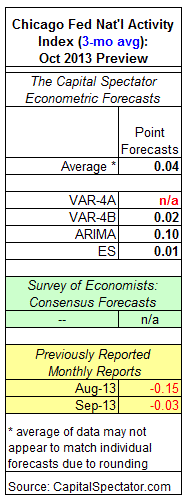The three-month average of the Chicago Fed National Activity Index (CFNAI) is expected to increase slightly to 0.04 in tomorrow’s update for October (scheduled for release on November 27), according to The Capital Spectator’s average econometric forecast. In the previous release for September, the three-month average was estimated at -0.03. Values below -0.70 indicate an “increasing likelihood” that a recession has started, according to guidelines from the Chicago Fed. Based on today’s estimate, CFNAI’s three-month average is projected to remain at a level that’s historically associated with economic expansion and at a marginally higher-than-average trend rate.
Note, however, that today’s projection is impaired because of missing data in one of the models for calculating the average forecast. Due to last month’s government shutdown, the September data for the US Leading Indicator published by the Philadelphia Fed hasn’t been updated and so the projection via the VAR-4A model (see details below) isn’t available at this time.
Meantime, here’s a closer look at the available numbers, followed by brief definitions of the methodologies behind The Capital Spectator’s projections:

VAR-4A: A vector autoregression model that analyzes four economic time series to project the Chicago Fed National Activity Index: the Capital Spectator’s Economic Trend & Momentum Indexes, the Philadelphia Fed US Leading Indicator, and the Philadelphia Fed US Coincident Economic Activity Indicator. VAR analyzes the interdependent relationships of these series with CFNAI through history. The forecasts are run in R with the “vars” package.
VAR-4B: A vector autoregression model that analyzes four economic time series to project the Chicago Fed National Activity Index: US private payrolls, real personal income less current transfer receipts, real personal consumption expenditures, and industrial production. VAR analyzes the interdependent relationships of these series with CFNAI through history. The forecasts are run in R with the “vars” package.
ARIMA: An autoregressive integrated moving average model that analyzes the historical record of the Chicago Fed National Activity Index in R via the “forecast” package.
ES: An exponential smoothing model that analyzes the historical record of the Chicago Fed National Activity Index in R via the “forecast” package.